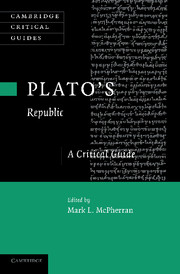Book contents
- Frontmatter
- Contents
- Acknowledgments
- List of contributors
- List of abbreviations
- Introduction
- 1 Socrates in the Republic
- 2 Platonic ring-composition and Republic 10
- 3 The Atlantis story: the Republic and the Timaeus
- 4 Ethics and politics in Socrates' defense of justice
- 5 Return to the cave
- 6 Degenerate regimes in Plato's Republic
- 7 Virtue, luck, and choice at the end of the Republic
- 8 Plato's divided soul
- 9 The meaning of “saphēneia” in Plato's Divided Line
- 10 Plato's philosophical method in the Republic: the Divided Line (510b–511d)
- 11 Blindness and reorientation: education and the acquisition of knowledge in the Republic
- 12 Music all pow'rful
- Bibliography
- Index of passages
- Index of names and subjects
5 - Return to the cave
Published online by Cambridge University Press: 04 February 2011
- Frontmatter
- Contents
- Acknowledgments
- List of contributors
- List of abbreviations
- Introduction
- 1 Socrates in the Republic
- 2 Platonic ring-composition and Republic 10
- 3 The Atlantis story: the Republic and the Timaeus
- 4 Ethics and politics in Socrates' defense of justice
- 5 Return to the cave
- 6 Degenerate regimes in Plato's Republic
- 7 Virtue, luck, and choice at the end of the Republic
- 8 Plato's divided soul
- 9 The meaning of “saphēneia” in Plato's Divided Line
- 10 Plato's philosophical method in the Republic: the Divided Line (510b–511d)
- 11 Blindness and reorientation: education and the acquisition of knowledge in the Republic
- 12 Music all pow'rful
- Bibliography
- Index of passages
- Index of names and subjects
Summary
INTRODUCTION TO THE PROBLEM
In the beginning of Book 2 of the Republic, Glaucon challenges Socrates to show that it is “better in every way” to be just than unjust (2, 357b1–2). Socrates responds to the challenge by telling Glaucon, “I want truly to convince you … if I can” (2, 357b3). Later in the Republic, however, it appears that those who should be the best qualified to realize that justice is always preferable – the philosophers of the kallipolis – find themselves in a situation in which they do not prefer to be just. Once they have “seen” the Form of the Good, they reach a point where, Socrates tells Glaucon, they are “unwilling to occupy themselves with human affairs” (7, 517c8–9). And yet, occupying themselves with human affairs is precisely what they must do, as their training has always ultimately been aimed at preparing them for their role in the state as leaders:
It is our task as founders, then, to compel the best natures to reach the study we said before is the most important, namely, to make the ascent and see the good. But when they've made it and looked sufficiently, we mustn't allow them to do what they are allowed to do today.
What's that?
To stay there and refuse to go down again to the prisoners in the cave and share their labors and honors, whether they are of less worth or of greater.
(7, 519c8–d7)- Type
- Chapter
- Information
- Plato's 'Republic'A Critical Guide, pp. 83 - 102Publisher: Cambridge University PressPrint publication year: 2010
- 2
- Cited by

